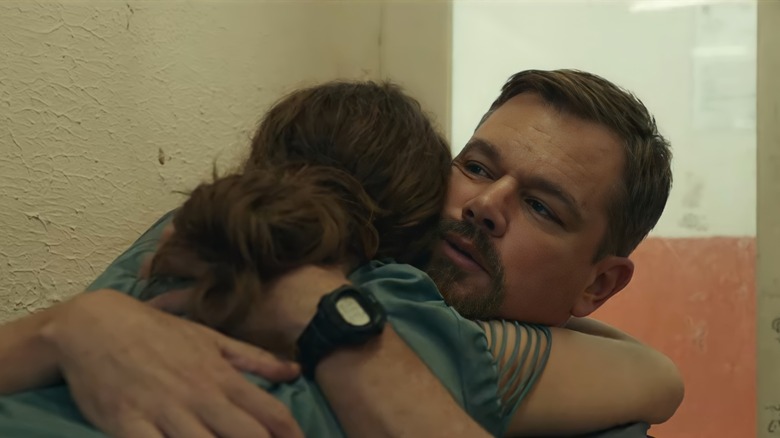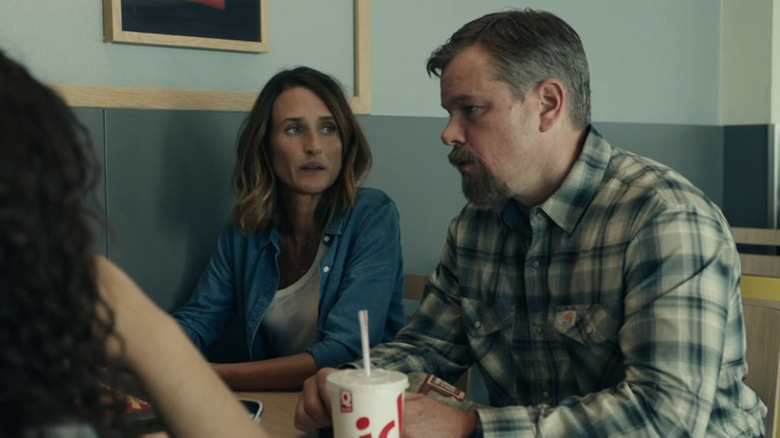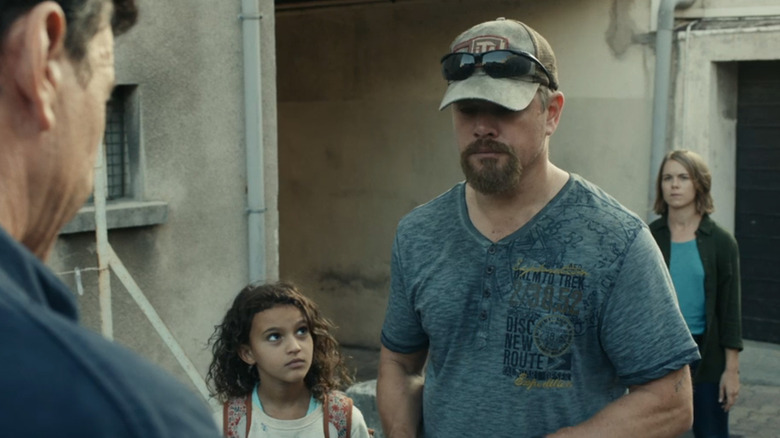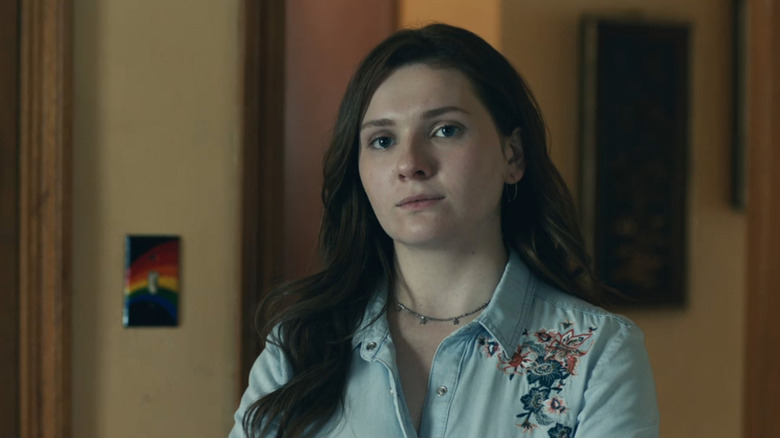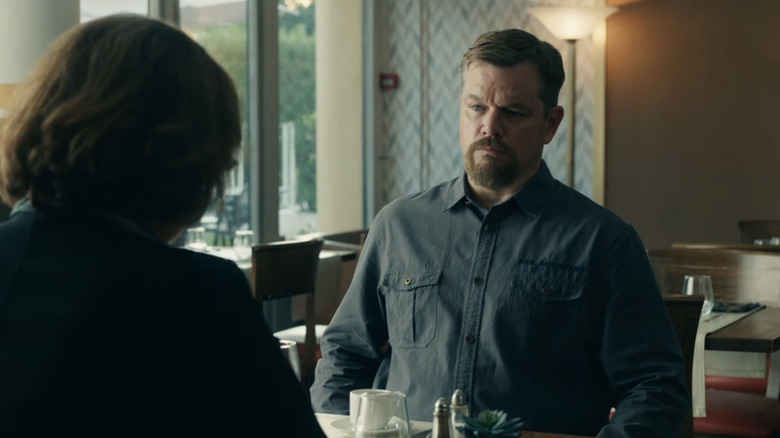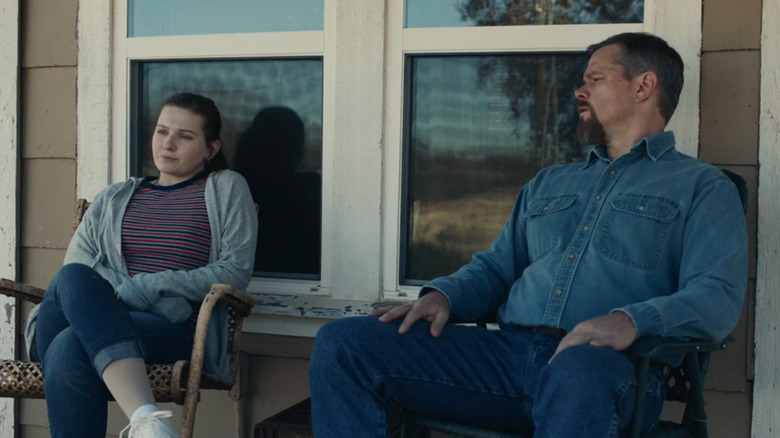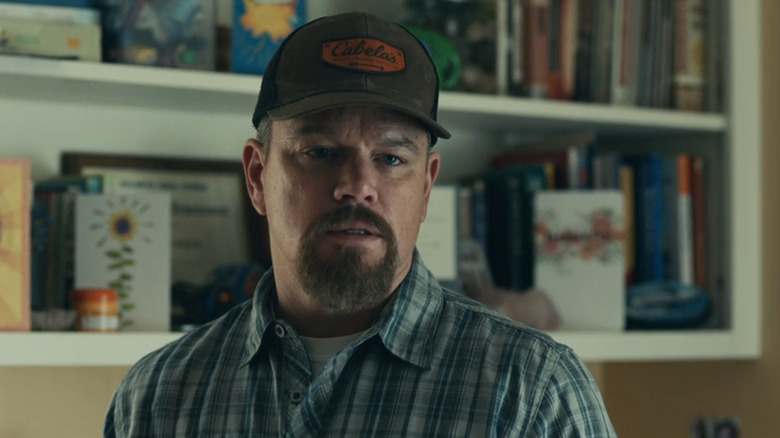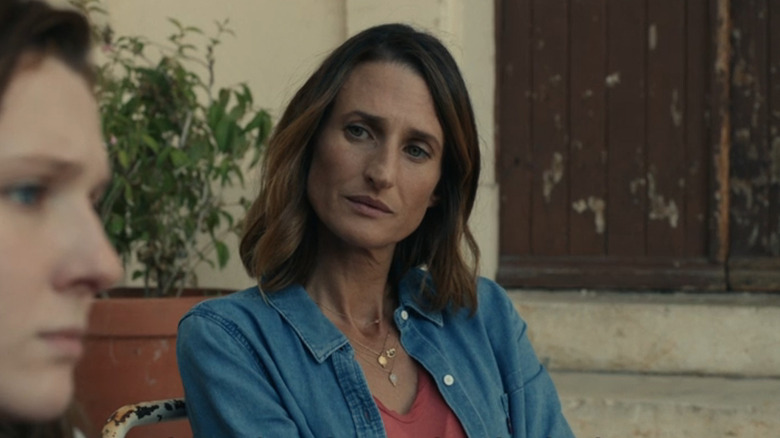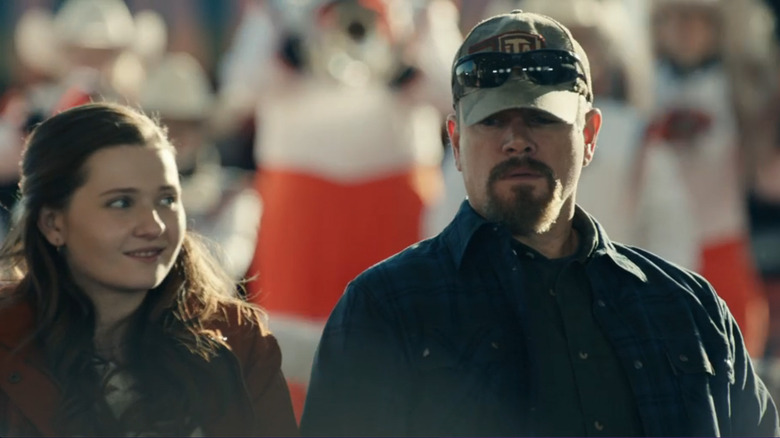The Ending Of Stillwater Explained
True crime stories make for some of the most popular documentaries, with salacious murders and other crimes becoming the biggest hits, particularly on streamers like Netflix, Amazon, and Hulu. But every once in a while, Hollywood takes a story ripped from the headlines and uses it as the basis of a dramatic thriller. The perfect example is 2021's "Stillwater," starring Matt Damon, which is loosely inspired by the murder of Meredith Kercher at the hands of a burglar, a crime that was initially pinned on American exchange student Amanda Knox.
"Stillwater" puts Damon into the role of struggling roughneck Bill Baker, whose daughter, Allison (Abigail Breslin), was convicted of murdering her former lover Lina while studying abroad. With five years left on his daughter's sentence, Bill visits her. When he learns of new evidence that might shed new light on the case, he finds himself a man on a mission to exonerate his daughter and bring her home.
Traveling from rural Oklahoma to Marseille, France, Bill becomes a fish out of water in a land he doesn't understand and is forced to rely on the generosity of a kind stranger (Camille Cottin) to see his mission through. A deliberately paced character study, "Stillwater" has a dramatic third act that turns the story completely on its head. And given the rapid-fire way things break in the climax, those who've seen "Stillwater" might still be scratching their heads at the film's shocking final moments. Here's the ending of "Stillwater" explained.
What you need to remember about the plot of Stillwater
Though heavily inspired by the murder of Meredith Kercher and the wrongful conviction of Amanda Knox, "Stillwater" begins in Stillwater, Oklahoma, rather than Knox's native Seattle. There we meet Bill, an unemployed oil rig worker whose daughter has already served five years of a nine-year sentence for the murder of her former roommate and lover Lina while living in France. Allison has steadfastly maintained her innocence, but she has learned not to count on Bill, who wasn't the best father growing up and can rarely be trusted with responsibility.
But after a visit to see his daughter in prison, Bill becomes determined to prove Allison's innocence when she claims to have learned the identity of a young man who may be the real killer: an Arab immigrant named Akim (Idir Azougli). After her lawyer and the police decline to investigate this new lead, Bill takes up the task himself. And he finds an ally in Virginie, a local Frenchwoman who lives with her young daughter, Maya (Lilou Siauvaud), in Marseille. Eventually, Bill and Virginie move in together and later forge a romantic bond, while Bill slowly becomes a father figure to Maya.
When one of Virginie's friends tracks down Akim, Bill's mission to clear Allison's name becomes more dangerous. And when Bill fails to get the evidence he needs after a violent altercation with the young man, Allison cuts off all contact with him.
What happened at the end of Stillwater
On the outs with his daughter after she learns that he tried and failed to clear her name by himself, Bill decides to stay in Marseille to be close to her despite their estrangement. He even begins to build a life with Virginie and Maya, helping out as a caretaker and getting a job with a local construction company. But when Bill has a chance encounter with Akim while attending a football match, he can't allow the person he believes to be the real killer to get away a second time, and he kidnaps Akim and holds him hostage.
Bill keeps Akim hidden in the basement of his apartment complex and swears little Maya to secrecy when she sees him. He then sends off a DNA sample to a lab, hoping it will match unidentified forensic evidence found at the original crime scene. A tip to the police, however, leads officers to Bill's basement. On the verge of his whole scheme unraveling, Bill is as shocked as the police to discover that Akim isn't there, with Maya lying to cover for him, too.
Nevertheless, the DNA sample he gave to Allison's lawyer (Anne Le Ny) is enough to cast doubt on Allison's guilt and get her freed from prison. It's a bittersweet end to Bill's quest, though, because Virginie — enraged at what Bill did to Akim and furious for involving Maya — ends their relationship, tearing him away from his new surrogate family.
Allison's bombshell admission
Throughout "Stillwater," Bill is unwavering in his support for his daughter and steadfast in his belief in her innocence. Certain that his daughter was framed for a heinous crime she didn't commit, he hopes to do right by his daughter not just to see her freed, but as a way of redeeming himself as a father in her eyes. Bill believes he knows his daughter better than anyone, and he is sure that she had nothing to do with Lina's murder. And that belief comes crashing down in the film's climax.
When Akim was held captive, the young man insisted that Allison was indeed involved in Lina's murder. He told Bill that Allison hired him to kill Lina, even paying him in part with a gold necklace that her father bought for her as a gift. Not sure what to believe, Bill still manages to get Allison home, but once back in Oklahoma — after being given a hero's welcome by the community and local officials — Bill confronts his daughter to learn what role she really played in Lina's death.
Unable to hold in her biggest secret, Allison tells her father what happened the night of the murder. Having caught her lover cheating, Allison says, she broke up with Lina and wanted her out of the house and hired Akim to "get rid of her." And while she says she never intended for any harm to come to Lina, Allison's instructions were misconstrued, leading to her ex-girlfriend's death.
What the ending of Stillwater means
At its core, "Stillwater" is an examination of trauma, grief, and letting go. It's about how Allison — a young woman with a good heart — made a fatal mistake and was forced to pay a steep price. And about how she must come to terms with her role in the death of her ex-girlfriend, while never even having a chance to say goodbye or mourn her loss. At the end of "Stillwater," we see Allison even getting a crude prison tattoo of Lina's name before she gets out — a symbol of her love, proving that she never wanted to hurt her.
But we also see that by the end of the film, Bill is a changed man, and not just because of the ordeal he went through to free his daughter. Earlier in the film, we'd learned that Bill once had struggles with drugs and alcohol, assumed to be the tragic way that he dealt with the death of his wife, Allison's mother. But this time, dealing with his daughter's incarceration and fight for justice, Bill has learned how to better deal with his problems by channeling his energy into something good — both his pursuit of justice and a new family. And in doing so, both Bill and his daughter learn the value of forgiving themselves. Similarly, Allison has finally found a way to overcome her resentment towards her father, while Bill comes to see past Allison's mistakes and sympathize with the reasons she left in the first place.
Why did Bill's view of Oklahoma change?
After Bill and Allison share a tearful moment, with Allison confessing her part in Lina's murder, the two share a solemn moment on their front porch. It's the first new morning that Allison's spent at home in years, and she remarks that nothing has changed. Her old hometown is exactly as she remembers it. But Bill doesn't agree ... in his final line, the world-weary laborer says that nothing looks the same at all. But what does he mean by that?
Bill's entire worldview has been challenged and changed by his fight to free his daughter. He came to know Allison in a way he'd never known her before, realizing that they are very different people. And through Virginie and Maya, Bill has learned to be a better man, husband, and father.
Another theme that's touched on, somewhat beneath the surface, is a message on bigotry and intolerance. Most French locals look down on Bill, who, being from the rural towns of the American South, is assumed to be a backward, gun-owning racist. He admits that he has many friends back home who harbor racist attitudes, and though he never expresses his own feelings on the matter, an encounter with a Frenchman with an open disdain for immigrants makes the message clear. Having been exposed to another culture and having fallen for the more socially conscious Virginie, Bill returns with a different perspective on the world.
Did Bill get the redemption he was looking for?
The driving force of "Stillwater" may be Bill's quest to prove Allison's innocence, but Bill is still the heart of the story — a father looking for one more chance to do right by his daughter. We learn throughout the film that Bill wasn't a very good parent. He had abused drugs and alcohol and spent time in prison himself, and he was rarely there for his daughter when she was growing up. She doesn't have a strong relationship with him, particularly after the death of her mother, and even when new evidence emerges in her case, she doesn't trust him to help.
Bill makes an early mistake, though — lying to Allison that their lawyer agreed to reopen the case when in reality he was handling it himself — and it drives his daughter away. But when he proves to Allison that he is there for her, staying in France to be close to her, she begins to realize that he may indeed be turning over a new leaf. And while she remains skeptical that he won't let her down again, Bill overcomes incredible odds to get Allison freed, and the two form a father-daughter bond that they'd never had before as Bill finally redeems himself in his daughter's eyes.
How did the ending of Stillwater compare to the story that inspired it?
"Stillwater" was heavily inspired by the story of Amanda Knox, a fact not lost on critics and audiences. But while the movie and the true story share many similarities, there are several striking differences, most notably at the film's conclusion. Allison Baker, like Amanda Knox, is an American college student who was studying abroad when her roommate was murdered. Like Knox, Baker is the prime suspect in the killing and is tried, found guilty, and sentenced to a lengthy prison term. Like Knox, Allison is eventually released and cleared of all charges when new evidence emerges.
In "Stillwater," however, it's ultimately discovered that Allison was at least partly responsible for her roommate's murder. That stands in stark contrast to what happened to Amanda Knox. Originally convicted of murder (among other charges) in 2011, Knox was sentenced to more than 20 years in prison alongside her boyfriend, Raffaele Sollecito, with jurors believing that Sollecito had held the victim down while Knox committed the actual murder (as reported by BBC News at the time).
Years later, though, new evidence came out that cleared Knox of the killing. After a complicated series of trials and appeals, Knox was finally declared innocent in 2015, with burglar Rudy Guede found to have committed the crime. Unlike Allison, there was never any implication after her final acquittal that Knox had played any role whatsoever in the murder.
What Camille Cottin says about the ending of Stillwater
At times in "Stillwater," the story is almost as much about Virginie and Maya's relationship with Bill as it is about Bill's fight for justice. When Bill moves in with Virginie, it's a purely platonic arrangement, but by the end of the film, they've fallen in love, making it a heartbreaking moment when she is forced to end their relationship. But it's this part of the story that Camille Cottin — who plays Virginie — says gives meaning that some audiences may have missed.
"I don't know if [the writers] realized how feminist it was," the actress told The List. "But it's a man who's wandered and lost, and really it's the women around him who help him open his mind and find the light." And there's certainly merit to this interpretation, as Bill has lost both of the most important women in his life: his wife and his daughter. Losing them — one to suicide, one to injustice — may be the very reason that Bill finds himself so directionless, and it's the connections he builds with Virginie and Maya that show him there is still hope left in this world and ultimately help him free his daughter.
Putting aside the more tangible help that Virginie provides — serving early on as a translator and giving Bill a place to live — it's her emotional support and steady presence that helps ground him. And through his blossoming father-daughter relationship with Maya, he's able to make up for not being there for Allison when she was young.
What director Tom McCarthy says about the ending of Stillwater
The relationship between the Amanda Knox story and "Stillwater" was evident to audiences, and director Tom McCarthy made no secret that it was that infamous case that inspired his movie. But when it diverges from the true story, it is neither overtly intentional nor accidental, according to McCarthy.
"We decided, 'Hey, let's leave the Amanda Knox case behind,'" McCarthy told Vanity Fair in 2021. "But let me take this piece of the story — an American woman studying abroad involved in some kind of sensational crime and she ends up in jail — and fictionalize everything around it." That meant centering the story on Allison's father, Bill, who is almost totally fabricated for the film: While Amanda Knox's father had been an outspoken advocate of his daughter, he had very little in common with he blue-collar Bill, nor did he ever initiate any kind of investigation of his own.
Tonally, McCarthy said that the film was aiming to feel more like a true-crime podcast than a dramatization of a true story. And for that reason, the story split wildly from Knox's mostly at its conclusion when Allison admits to being unwittingly involved in the murder. But McCarthy suggested that this plot twist simply flowed out of the movie's story, and wasn't intended to mirror the Knox trial, instead serving as a thematic capper to the story they were telling, rather than real life. "Allison's innocence or guilt is crucial to the story, thematically," McCarthy said.
What Amanda Knox says about the ending of Stillwater
Since the movie was released, much has been made about the similarities between Allison Baker's story and that of Amanda Knox. Released from prison several years before the movie even entered production, Knox herself commented on the film in 2021 and said she wasn't much of a fan, criticizing many aspects of the film. She took issue with the invented romance between Allison and the murdered girl, Lina, but more obviously egregious is the dramatic final twist that implicated the character that was clearly based on herself.
"How do you think that [ending] impacts my reputation?" Knox asked in a 2021 op-ed for The Medium. "I continue to be accused of 'knowing something I'm not revealing,' of 'having been involved somehow, even if I didn't plunge the knife.' So Tom McCarthy's fictionalized version of me is just the tabloid conspiracy guilter version of me." By making the Allison character complicit, Knox said, the film might cause audiences to second guess Knox's own innocence, when the real issue that she said should have been examined was the rampant police corruption and mishandling of her case.
"By fictionalizing away my innocence, my total lack of involvement, by erasing the role of the authorities in my wrongful conviction, McCarthy reinforces an image of me as a guilty and untrustworthy person," she wrote. Knox criticized the filmmakers for not even talking to her before making a film inspired by her story, even using McCarthy's Vanity Fair interview as damning evidence of their callousness.
Unanswered questions from the ending of Stillwater
One can disagree with Amanda Knox's criticisms of "Stillwater" and its ending if they wish, but one thing she is certainly right about is how the film glosses over the police's mishandling of the initial murder investigation and the miscarriage of French justice in the courtroom that saw an innocent young woman convicted of a murder she didn't commit. As the police officers say themselves, the murder weapon was never found, and the only evidence against Allison is circumstantial. The presence of unidentified DNA on the victim, meanwhile, should have raised obvious red flags and could have been enough on its own to cast doubt on the prosecution's case.
Beyond the original case, though, the film still leaves us with several unanswered questions. With the knowledge that another man — whose DNA police now have — was involved in the death of Lina, will authorities start a new hunt for Akim? And if so, will he be able to evade authorities? If he is apprehended, he would surely tell police of Allison's involvement, which could even draw her back to Marseille to face new charges.
Finally, the question many viewers may be pondering after seeing the film is how Akim escaped Bill's basement before the authorities were able to discover him. It's never said directly, but it's implied that it was Viriginie, who must have discovered him below the apartment complex. And while she ends her relationship with Bill over the abduction, it's strongly suggested that she let Akim go to save Bill from being caught, proving her love for him.
Static Media owns and operates Looper and The List.
